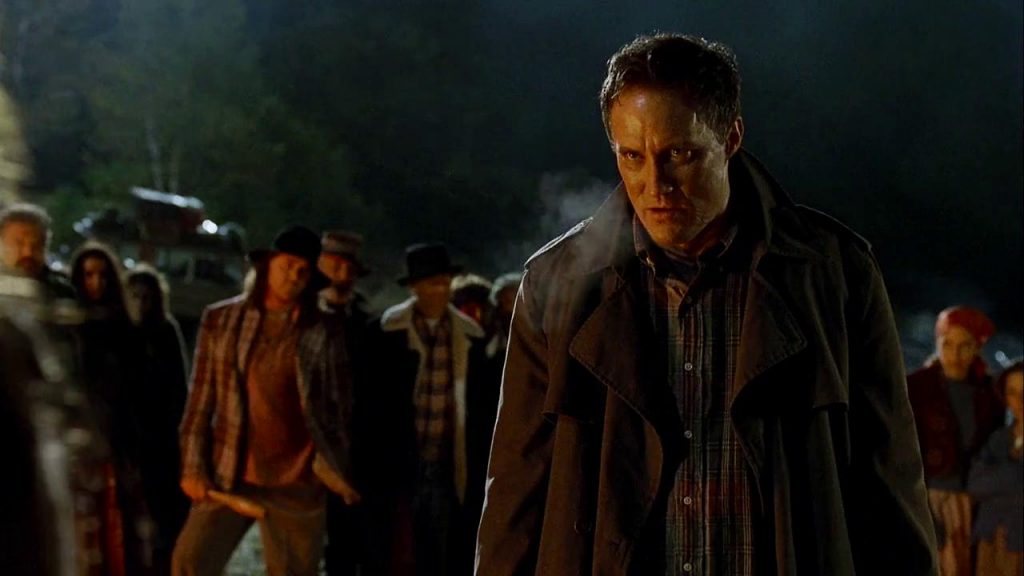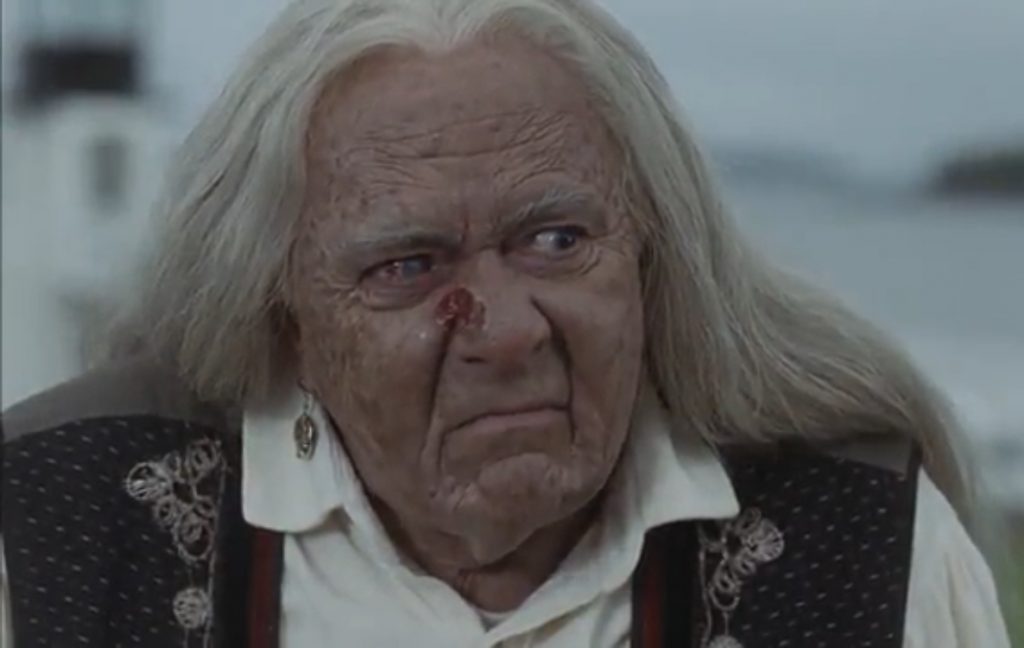Woke up in the morning dream thinking about Thinner. You know that slough when you’re not quite awake or asleep? I might have developed my novel about the immortal jester in one of those, the morning after I watched Shallow Hal with my Uncle Frank and Neil Young’s After The Gold Rush was still rattling around my brain.Anyway, Thinner. *Possible spoilers*I think this might be King/Bachman’s most underrated book. I think it’s because people don’t see the forest for the trees. The visceral nature of the curses is such a grotesque spectacle, it’s easy to fixate on that, and forget the themes and characters that make it truly disturbing in a deeper way. It’s not just a freak show; it’s a morality play.
Per King’s website:”This is a novel of unrelenting terror and growing horror; it is also a nightmarish allegory about what lies beyond the limits of prosperous American complacency and where the responsibilities of human actions ultimately lie.”

First Billy. It’s easy to frame the story, if you haven’t read the book or seen Tom Holland’s excellent adaptation, as a man trying to escape a horrifying curse placed on him after a car accident. But Billy is not blameless, neither in accidentally running the old woman down and certainly not with what happens next. He is an antihero, not simply a victim wasting away, and that is what is so fascinating. When begging for mercy doesn’t work, he turns to retribution. But, just like the accident itself, he tries to avoid personal responsibility. He’s not the one setting fire to the Romani camp, killing their dogs, or scaring children with a machine gun, right? The way his bitterness towards his wife grows is key, and figures in the disturbing ending, which I read as more ambiguous and differently than others. (Isn’t it more more disturbing a fate, and the natural conclusion for the story and character, should he eat his pie and have it too?) Billy Halleck is unnerving to witness, because we don’t just witness his body withering away, but his soul as well.

Tadzu Lemke. It’s easy to just paint him as the sinister Gypsy stereotype, but there is more going on here. He’s not some evil sorcerer casting grotesque spells for the fun of it. He WAS wronged. His daughter was killed, and denied by a corrupt legal system the conventional justice he was due. Yet the black magic justice he takes into his hands is outrageous and wicked. What gives him the right to supernaturally torture three men to death over the course of months? Sadistic revenge is not justice. And his stubbornness to remove the curse endangers his own community. They are threatened, their property destroyed, driven out of one place and to another, and frightened. He wanted to avenge his daughter’s death, but risks the lives of his grandchildren as they tearfully beg him to take it off. He has no moral high ground as he lectures Billy in their final scene together. Just as the Thinner curse was placed on Billy as the consequence of Billy’s own actions, so too was The Curse of The White Man From Town from Tadzu’s.
As an aside, I wasn’t really sure, just from reading the novel, what Stephen King really thinks of his Romani characters in general. The NRA bumper stickers the book mentions on their trailers really threw me off, given how adamantly opposed politically King is to the National Rifle Association and guns. Was he inventing an association to make them more sinister, or is this an immersive detail actually based on something in real life? Are Gypsies gun nuts? Maybe they have reason to be. Considering the startlingly compassionate monologue from one of the other two men who helped Billy escape justice and is now suffering from a grotesque curse of his own. I forgot if it was the cop who didn’t issue a breathalyzer or the judge who threw the whole thing out. Anyway, he talks to Billy about all the sufferings and persecutions the Romani have suffered and do suffer, exiled from one country after enough, forced to be refugees, social stigma, sexual abuse, etc, etc. The complexity of King’s moral maturity is the unfortunate truth that often what happens first is bad things happen to people who will be bad themselves as a result. An explanation is not an excuse. What has happened to Tadzu’s people is indefensible, but so is the coldness of his heart.
On the other hand, starting with writing a story about this curse in the first place, King does fall back on damaging and simplistic stereotypes that makes it very easy for the audience to simply write off Tadzu as the “evil old Gypsy”. Same could be said for the Mafia stereotypes in the Italian-American…

Finally, best for last, Richie “The Hammer” Ginelli. Joe Mantegna’s enthusiastic performance in the movie helps a lot. Probably I enjoyed him too much and perhaps my favorite King character (though Tucker Cleveland* is up there.) Richie is so fascinating and so fun because of his attitude and nature. This is a supernatural thriller, but he is deliberately NOT a supernatural character. He is not a magician or an exorcist. He doesn’t fight magic with magic, but pure balls and ruthlessness. Richie is so salaciously entertaining to watch because after witnessing so much of Lemke’s cruelty, him laughing as a man he turns into a monster begs for forgiveness, he is hit back with a hammer, a man fearlessly striking back, who will NOT be cowed or bullied by the dark magic that makes other men blubber. He’s having fun, and, inappropriately, so are we. It’s the same reason some horror movies that don’t drag it out for a sequel can be so satisfying. Sometimes the Boogeyman should be spanked.But Richie IS bad, he’s destroying property, terrorizing Innocents, and threatening a young woman with acid. By the end, there is the disturbing implication that he might have been willing to hurt children to get what he wants.
I’ll finish with two memorable scenes from the book, both about Billy’s perception of Richie. Not even full scenes, just Billy’s thoughts.First when Billy first turns to the mobster for help. After Richie recovers from his initial shock and disbelief at seeing Billy’s curse, he nonchalantly asks, “Do you want me to hit him?” Billy has a momentary, ridiculous thought of Richie walking up to Tadzu and punching him. It’s darkly humorous moment, but also telling and chilling. He immediately realizes, of course, what Richie really means. It’s now that the lawyer has to face the undeniable fact that he has defended a cold-blooded murderer in court, gotten him off from justice, and is turning to him for help.Then when Billy sees how much Richie is enjoying their war against the Lemke’s, he realizes that while Tadzu might know how to take off the Thinner curse, he himself has no idea how to stop The Curse of The White Man From Town.
Tadzu’s description of the curse is frankly a brilliant allegory. This curse isn’t just going to disappear into thin air. It is alive, a cancer that somehow has to eat. The cycle of vengeance and evil is like that. This is the story of three reprehensible men of debatable levels of responsibility. The innocent are hurt, the guilty get worse, and the curses grow.
But whose fault is that?
*Down here

It’s been a long time since I read the short story. It might be he’s an invention for the movie. So perhaps less credit goes to King himself so much as Brad Dourif in bringing this endearing character to life, who is not as odd as you might think from a Brad Dourif character in a Stephen King movie. Good old boy, Vietnam veteran (with a relevant backstory monologue perhaps deliberately evocative of Quint in Jaws), friendly, brave, and earnest in helping the more generic main hero fight these monstrous rats, he’s a character you don’t have to feel bad about liking. He is a touch eccentric, but that’s his charm, and what do you expect? He is Brad Dourif in a Stephen King movie, after all.